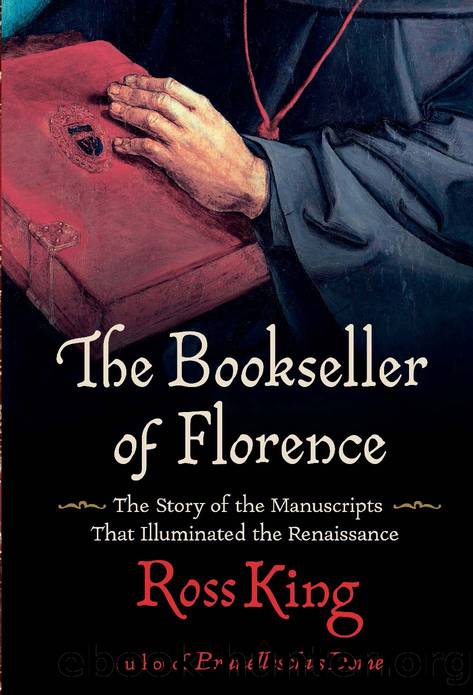The Bookseller of Florence by Ross King

Author:Ross King
Language: eng
Format: epub
Publisher: Grove Atlantic
* * *
Besides refuting the pugnacious George of Trebizond, Cardinal Bessarion had also been eager, as he put it, to âgather and preserve almost all the works of the Greek wise men.â8 For fifteen years his manuscript hunters had been scouring the occupied or endangered lands of the East in search of these works. No expense was spared, and reports of Bessarionâs spending vary from 15,000 to 30,000 ducats. By 1468 his library encompassed 746 manuscripts, of which 482 were in Greekâthe largest and finest collection of Greek literature in Europe at the time.9 But having reached his late sixties, Bessarion was forced to consider what should become of these treasures following his death. Florence would have been a natural beneficiary given its many scholars with their devotion to Greek letters, as well as its public library and sympathetic patrons such as the Medici. Likewise, the Vatican Library in Rome might have made a worthy repository due to the presence of the three printers, especially Sweynheym and Pannartz. Their campaign to print the classics would have ensured that in time the manuscripts were turned into printed books and widely disseminated, thus ensuring their survival.
But Cardinal Bessarion chose neither, instead selecting Venice and donating his manuscripts to the Basilica of San Marco. He made his choice not because of the caliber of Veniceâs scholars (in the 1460s the republic was still an intellectual hinterland compared to Florence, Rome, and Naples) but rather for its geographical position between East and West and, perhaps most important, for what he regarded as its political stability. He was also, as Vespasiano pointed out, âon the friendliest of terms with the Venetians.â10 Bessarion was evidently undeterred by the fate of Petrarchâs collection, the remains of which, a century after his bequest, were, despite various promises from the Venetian government of a purpose-built library, decaying and crumbling in a neglected chamber under the roof of San Marco.
In May 1468 Bessarion wrote a letter to the doge, Cristoforo Moro, justifying his gift with an eloquent plea for learning. He pointed out that âthere is no more worthy or honorable possession, no more dignified and valuable treasure,â than a book. âThey live, they converse and speak with us, they teach us, educate us, console us,â he wrote. Books bring the past to life and place it before our eyes, they offer examples to emulate, they tell us of things both human and divine. Without them, he wrote, we are rendered âbarbarous and unlettered.â After referring to âthe fall of Greece and the pitiful capture of Byzantiumâ he described how, having gathered these works together, he now wished to ensure that âthey would never be scattered about or lost ever again.â11 In keeping with his humanist beliefs, Bessarion insisted that these manuscripts should beâlike those in the library of San Marco in Florenceâaccessible to the public, with the constant presence of two custodians to safeguard them.
The Venetian Senate graciously accepted this bequest, promising to lodge the books in a part of the ducal palace to be called the âLibrary of San Marco.
Download
This site does not store any files on its server. We only index and link to content provided by other sites. Please contact the content providers to delete copyright contents if any and email us, we'll remove relevant links or contents immediately.
Blood and Oil by Bradley Hope(1253)
Daniel Holmes: A Memoir From Malta's Prison: From a cage, on a rock, in a puddle... by Daniel Holmes(1121)
Ambition and Desire: The Dangerous Life of Josephine Bonaparte by Kate Williams(1090)
Wandering in Strange Lands by Morgan Jerkins(1020)
It Was All a Lie by Stuart Stevens;(944)
What Really Happened: The Death of Hitler by Robert J. Hutchinson(875)
London in the Twentieth Century by Jerry White(850)
Time of the Magicians by Wolfram Eilenberger(846)
Twilight of the Gods by Ian W. Toll(815)
The First Conspiracy by Brad Meltzer & Josh Mensch(814)
The Japanese by Christopher Harding(804)
A Woman by Sibilla Aleramo(800)
Lenin: A Biography by Robert Service(782)
The Devil You Know by Charles M. Blow(782)
Reading for Life by Philip Davis(777)
Cleopatra by Alberto Angela(771)
Twelve Caesars by Mary Beard(771)
1965--The Most Revolutionary Year in Music by Andrew Grant Jackson(717)
The Life of William Faulkner by Carl Rollyson(716)
